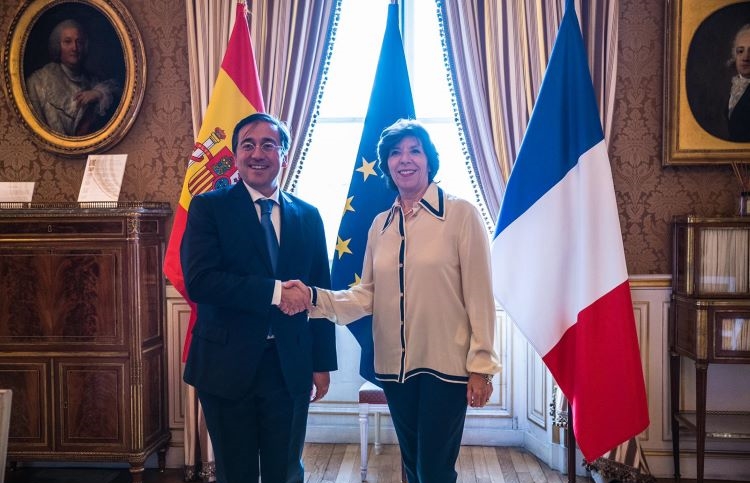Eduardo González
The Minister of Foreign Affairs, José Manuel Albares, held yesterday in Paris his first meeting with the new Minister for Europe and Foreign Affairs of France, Сatherine Colonna, with whom he addressed, among others, the issue of energy interconnections, an issue that has gained great importance with the war in Ukraine and that could be relaunched with the recovery of the MidCat project, interrupted in 2019.
Yesterday’s was the first face-to-face meeting of Albares with Colonna, who was elected at the head of the Ministry last May 20, replacing Jean-Yves Le Drian, following the re-election of the President of the Republic, Emmanuel Macron, for a second term. Albares and Colonna held a first telephone conversation last May 27.
According to Foreign Affaisrs sources told The Diplomat, Albares and Colonna spoke during the meeting about the war in Ukraine, the upcoming NATO Summit – to be held in Madrid next June 29-30 – and support for Sweden’s and Finland’s candidacies to join the Atlantic Alliance. The two heads of diplomacy also took advantage of the meeting to “share experiences” on the current French Presidency of the Council of the EU with a view to the next Spanish Presidency, which will take place in the second half of 2023.
The two ministers also discussed the Dual Nationality Agreement between Spain and France, signed on March 15, 2021 during the XXVI Spanish-French summit and which came into force on April 1. France is the first country outside the Ibero-American sphere with which Spain has an agreement of this nature.
Interconnections
Albares and Colonna also discussed the subject of interconnections “as an element for advancing the energy independence of the EU”, according to the aforementioned Foreign Ministry sources, who did not add any further details about the conversation.
Spain and France maintain a very low energy interconnection -only 2.8%-. The last extraordinary European Council, held on May 30 and 31 in Brussels, urged to “complete and improve the interconnection of the European gas and electricity networks” in order to reduce Russian energy dependence and to take advantage of “the potential of the Iberian Peninsula to contribute to the security of supply of the European Union”. Spain and Portugal have repeatedly insisted that the Iberian energy hub can be an alternative to energy dependence on Russia thanks to its regasification plants, but they have also warned that, for this, it is necessary to complete the energy interconnections between Spain and France.
Last Thursday, Dominique Mockly, CEO of the French gas network Teréga, which operates in the southwest of France, announced the possibility of recovering the MidCat (Midi-Catalonia) interconnection project between Spain and France, launched in 2013 and abandoned in 2019 because of its high cost and its impact on the environment. According to the company, the energy crisis caused by the Russian invasion of Ukraine and the possibility of taking advantage of Spain’s significant “capacities” in terms of “importing liquefied natural gas” make it advisable to reopen this project. Recently, the President of the European Commission, Ursula von der Leyen, declared that “cross-border projects, such as the link between Portugal, Spain and France”, could be of “crucial” importance to “reduce dependence on Russian fossil fuels” in the framework of REPowerEU, Brussels’ plan to get rid of Russian gas, valued at 300 billion euros.







